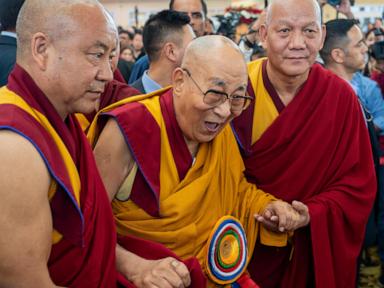DHARAMSHALA, India — In a significant statement that may shape the future of Tibetan Buddhism, the Dalai Lama announced on Wednesday that the institution of the Dalai Lama will persist beyond his lifetime. This declaration ends years of speculation that began when he suggested he might be the last to hold the revered position. The announcement was made during prayer celebrations leading up to his 90th birthday this Sunday.
The Nobel Peace Prize laureate emphasized in a recorded message that the process of identifying the next Dalai Lama should adhere to traditional Buddhist practices. This announcement is crucial for Tibetan Buddhists who believe that the Dalai Lama can choose his reincarnation, a practice that has been followed for over four centuries since the institution’s inception in 1587.
Historical Context and Current Implications
Tenzin Gyatso, the current Dalai Lama, became the 14th reincarnation in 1940. His life took a dramatic turn in 1959 when he fled Tibet following a failed uprising against Chinese rule in Lhasa. Since then, he has lived in exile in Dharamshala, India, where he continues to be a spiritual leader for Tibetans worldwide.
The Dalai Lama’s insistence that his successor be born outside of China is a direct challenge to Beijing’s claim of authority over the reincarnation process. China, which views the Dalai Lama as a separatist, has asserted that it alone has the right to recognize the next Dalai Lama, a stance that has been met with resistance from the global Tibetan community.
Expert Opinions and Reactions
Experts in Tibetan affairs see this announcement as a reaffirmation of Tibetan autonomy in spiritual matters. Dr. Lobsang Sangay, former Sikyong (President) of the Central Tibetan Administration, remarked,
“The Dalai Lama’s statement is a powerful assertion of the Tibetan people’s right to determine their spiritual future, free from external interference.”
Meanwhile, scholars of Buddhism note that the Dalai Lama’s decision is rooted in a long-standing tradition that has historically been crucial for maintaining Tibetan cultural identity. Professor Robert Barnett, a Tibetan studies expert, commented,
“This move is not just about religion; it’s about preserving a cultural legacy that has been under threat for decades.”
Political Tensions and Global Impact
The Dalai Lama’s announcement has far-reaching implications, particularly in the context of Sino-Tibetan relations. China’s claim over the reincarnation process is seen as part of a broader strategy to exert control over Tibet. The international community, including human rights organizations, has often criticized China’s policies in Tibet, citing cultural and religious repression.
In response to the Dalai Lama’s statement, Beijing reiterated its position, emphasizing that the reincarnation process is a matter of Chinese sovereignty. This ongoing dispute highlights the complex interplay between religion and politics in the region.
Looking Ahead: The Future of Tibetan Buddhism
As the Dalai Lama approaches his 90th birthday, the question of his succession remains a topic of global interest. Tibetan Buddhists in exile and within Tibet continue to advocate for a reincarnation process that respects their traditions, free from political influence.
The Dalai Lama’s commitment to ensuring the continuation of his spiritual lineage offers hope to many who fear the erosion of Tibetan culture under Chinese rule. As the world watches, the future of Tibetan Buddhism hangs in the balance, with the next steps likely to shape the region’s religious and political landscape for years to come.
The announcement comes at a critical juncture, as Tibetans and their supporters worldwide rally to preserve their cultural and spiritual heritage. The Dalai Lama’s words serve as a reminder of the enduring resilience of the Tibetan people and their unwavering commitment to their beliefs.
 Jury Deliberations Continue in Sean “Diddy” Combs Trial Amid Racketeering Dispute
Jury Deliberations Continue in Sean “Diddy” Combs Trial Amid Racketeering Dispute Fiji Rejects Chinese Military Base Amid Pacific Power Struggle
Fiji Rejects Chinese Military Base Amid Pacific Power Struggle Shocking Revelations of Mass Deaths in Syrian Prison Near Damascus
Shocking Revelations of Mass Deaths in Syrian Prison Near Damascus Shocking Revelations: Mass Executions in Syrian Prison Uncovered
Shocking Revelations: Mass Executions in Syrian Prison Uncovered Paramount Settles Trump Lawsuit Over ’60 Minutes’ Interview for $16 Million
Paramount Settles Trump Lawsuit Over ’60 Minutes’ Interview for $16 Million